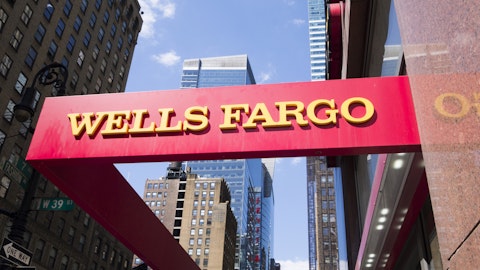In this article we take a look at 5 Biggest companies that were dropped from the Dow Jones Industrial Average (DJIA) index. If you want to read about the importance of the Dow index and some of the biggest companies that were booted from the index, go directly to 10 Biggest Companies That Were Dropped From the Dow Jones Industrial Average (DJIA)
5. Raytheon Technologies Corp (NYSE: RTX)
Raytheon was booted from the Dow after just spending 5 months on the index. The company was replaced by industrial giant Honeywell. Raytheon shares rallied in late January after CEO Greg Hayes pledged to increase share buybacks. In the fourth quarter, Raytheon Technologies posted a non-GAAP EPS of $0.74, above the Street forecasts by $0.05. Revenue in the period jumped by 111% and reached $16.6 billion.
As of the end of the third quarter, Eric W. Mandelblatt’s Soroban Capital Partners owns 13.93 million shares of Raytheon, worth 801.47 million.
Read: 5 Best Defense Stocks to Buy for 2021
4. Citigroup Inc (NYSE: C)
Citgroup was removed from the Dow in 2009. In the fourth quarter, the bank posted GAAP EPS of $2.08, beating the Street’s forecast by $0.72. Revenue in the quarter declined over 10% and reached $16.5 billion, missing the consensus by $210 million.
As of the end of the third quarter, 91 hedge funds tracked by Insider Monkey held stakes in Citigroup. The total value of these stakes is $5.5 billion.
Here’s what Oakmark Select Fund, an investment advisory firm that provides asset and wealth management, said about Citigroup in their Q3 Investor Letter:
“Citigroup was our largest detractor for the period due to Covid-19-related concerns that have hurt the entire financial sector, as well as a handful of Citigroup-specific headlines that amplified near-term uncertainty. We believe that investors’ short-term focus can cause them to miss the bigger picture. The company has remained profitable throughout the Covid-19 crisis to date. It continues to operate with significant excess capital relative to regulatory minimums, even as it has added more than $10.5B to credit reserves year to date. We believe the company is proving its resilience during a real-life stress test. Yet, despite this positive early evidence, Citigroup currently trades at only 60% of tangible book value and slightly over 5x 2019 earnings per share. Given that we think the company’s normalized earnings power is greater than what it achieved in 2019, we find these valuation metrics especially attractive. As we move beyond the pandemic, we think investors’ focus will shift to the underlying quality of the business and they will value the resilience Citigroup demonstrated during this crisis.”
3. Exxon Mobil Corporation (NYSE: XOM)
Oil giant Exxon was removed from the Dow Jones Industrial Index in 2020, replaced by CRM company Salesforce. Exxon had been in the Dow in some form since 1928. Exxon stock is down more than 27% over the last 12 months. In the fourth quarter, ExxonMobil (NYSE:XOM) reported non-GAAP EPS of $0.03, beating the Wall Street estimates by $0.01. However, revenue in the quarter slid 30% and reached $46.5 billion, missing the Street’s forecast by $2.22 billion.
As of the end of the third quarter, 52 hedge funds out of the 816 funds tracked by Insider Monkey held stakes in Exxon. The total value of these shares is about $1.4 billion.
First Eagle Investment Management said the following about XOM shares in their Q3 2020 Investor Letter:
“The stock of Exxon Mobil continued to struggle in the third quarter, and it lost roughly half its market cap year to date. Despite this, we believed Exxon Mobil was well-equipped to contend with lower prices and remained a compelling investment. The company demonstrated high levels of operational flexibility during the difficult market environment and maintained an upward drift in earnings power. Its high-quality, long-duration assets occupy attractive positions on the cost curve.”
2. Pfizer Inc. (NYSE: PFE)
Biotech company Amgen replaced Pfizer in the Dow Jones index in 2020. Estimates show that the company is set to make a whopping $15 billion worth of Covid-19 vaccines in 2021. Pfizer-BioNTech COVID-19 vaccine received green light by the FDA in December 2020.
In 2020, Pfizer expects its revenue to come in between $59.4 billion – $61.4 billion, compared to the Wall Street estimate of $56.3 billion.
A total of 66 hedge funds tracked by Insider Monkey have positions in the company, as of the end of the third quarter.
Read: Were Hedge Funds Right About Pfizer Inc. (PFE)?
1. AT&T Inc. (NYSE: T)
Ranking first on the list of 5 biggest companies that were dropped from the Dow Jones Industrial Average (DJIA) is AT&T. After nearly 100 years on the Dow, AT&T was removed from the index in 2015, replaced by Apple. In January, AT&T posted upbeat results for its fourth quarter. Mobility revenue in the period jumped 8%, while equipment sales increased by 28%. HBO Max topped 41 million domestic subscribers, while worldwide subscribers came close to 61 million. Recently, some media reports said that AT&T was in talks with private equity firm TPG to sell a minority stake in DirecTV.
A total of 51 hedge funds tracked by Insider Monkey held stakes in AT&T as of the end of the third quarter.
Here is what Distillate Capital said about AT&T shares in their Q2 2020 Investor Letter:
“AT&T and IBM exited the portfolio as they no longer met the quality criteria for inclusion with AT&T exceeding the debt limit and IBM falling out due to deteriorating long-term fundamental stability.”
Please also see Short Seller Jim Chanos’ Top Picks and 15 Biggest Petrochemical Companies in the World





